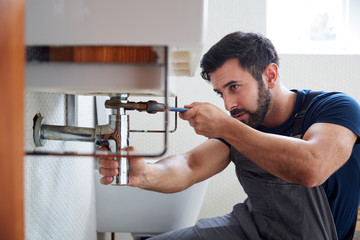Plumbers install, repair, and maintain residential and commercial buildings’ pipes, valves, fittings, and drainage systems. They also collaborate with general contractors and electricians during construction. Plumbing is a trade that requires physical strength and stamina. However, it is also a rewarding career that offers job stability and a good salary.

A plumber installs and repairs pipes that carry water, gas, and waste to and from homes and businesses. Plumbers Aurora CO also work with plumbing fixtures such as bathtubs, toilets, and sinks. Plumbers often use hand tools to install pipes, pipe fittings, and valves in home and business buildings. They can bend, cut, thread pipe, and join pipes using bolts, welding, soldering, and other methods. They also clean drains, remove obstructions and repair or replace broken pipes and plumbing fixtures. They may test piping systems to detect leaks or other problems.
They collaborate with general contractors, electricians and other construction professionals to install, repair and maintain pipes, valves, fittings and drainage systems in commercial and residential structures. They follow building plans and blueprints, respond to plumbing emergencies and perform routine inspections.
Education and Training Requirements. A plumber installs, maintains and repairs plumbing systems in residential and commercial buildings. They also repair leaks, unclog drains and replace faulty pipes and valves.
A career as a plumber requires candidates to have academic qualifications from technical schools or community colleges related to this field. They must also participate in an apprenticeship scheme that lasts four to five years.
During an apprenticeship, they learn how to perform skilled plumbing tasks under the supervision of a master plumber. They also gain knowledge of safety practices and the standards of the plumbing trade.
A plumber installs, repairs and maintains water and sewage systems in residential, commercial and industrial buildings. They install water heaters, water and sewer lines and fixtures to supply potable (drinkable) water or waste water to and from building interiors and exteriors. They also manage sewage systems and redirect pipes to prevent flooding.
Plumbers work in a wide range of settings, from residential homes and businesses to large industrial plants. They install and repair plumbing systems, primarily water supply and drainage.
A typical day of work includes digging trenches, inspecting pipes and other plumbing materials, locating positions for products, cutting openings and installing them. A plumber may also perform electrical work and carpentry work.
Some plumbing jobs are specialized, such as drain and sewage systems, while others involve the installation of piping and fixtures for showers, tubs and sinks. They may also work on gas pipes.
Plumbers work in homes and businesses, installing and repairing pipes and plumbing fixtures that carry water and other liquids. They also install sewage and drainage systems.
A plumbing career offers a good salary, a stable job, and advancement opportunities. The building boom and trade worker shortage are driving a need for more skilled plumbers to fill vacancies.
You can enter the profession after high school or through technical training programs. These include plumbing schools, vocational institutes, and trade colleges.
The job requires physical stamina, as you may need to climb ladders or lift heavy equipment and parts. You can also expect to work long hours. Most plumbers work full time, including nights and weekends. However, self-employed plumbers can choose their own schedules and work as much or as little as they want.
Plumbers install, repair, and maintain pipes that transport water, gas, or other fluids in homes and businesses. They also ensure that plumbing systems comply with regulatory codes and standards. A career as a plumber can be a rewarding one with many possible job options. However, it requires a lot of hard work, training and patience.
Plumbers are construction professionals who repair and install pipes that transport water and other fluids. They also handle fixtures that take waste away from homes and businesses. Plumbing systems require a lot of maintenance and care. Some of the most common problems include clogged drains, leaking pipes and broken fixtures. A professional plumber is the best option for most issues.
The cost of plumbing repairs can range from a few hundred dollars for a small job to thousands of dollars for a major leak. Some plumbers use flat-rate pricing for certain tasks, while others charge by the hour. The best way to find out what you will be paying for is to get an estimate from a licensed plumber. The company may also ask about any permits you need and other fees related to the job. Some plumbers also offer warranties on their work. They may even have a special tool for the job. It’s a good idea to keep these tools on hand, as they can save you from headaches in the future.
